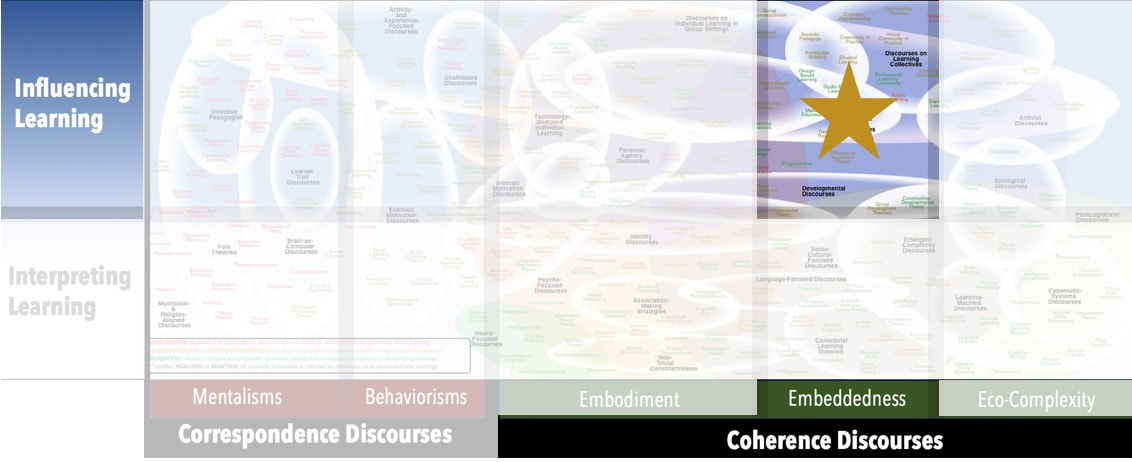Focus
Organizational self-awarenessPrincipal Metaphors
- Knowledge is … the scope of possible activity of an organization
- Knowing is … current activity of an organization
- Learner is … an organization
- Learning is … changes in practice that enhance the scope of possible activity
- Teaching is … effecting and measuring adaptation
Originated
1990sSynopsis
Organizational Metacognition refers to an awareness of what an organization knows. Such knowledge includes insight into what enables and constrains learning. Associated discourses include:- Collective Memory:
- Institutional Memory – an older, more common, and less formalized notion than Organizational Memory (see above) that is typically defined in much the same way. By way of subtle difference, Institutional Memory is perhaps more often seen to reside in the personal memories and experiences of veteran members of the organization.
- Organizational Memory (V. Anand, C. Manz, & W.H. Glick, 1990s) – the combination of a group’s explicit knowledge (available through policy documents, data bases, etc.) and tacit knowledge (enacted in interactions and communications)
- Transactive Memory (Daniel Wegner, 1980s) – a hypothesis on collective knowledge that looks across each individual’s memories, the possibilities that arise in interactions among individuals, and the information encoded in the collective’s structures and records.
- Negotiated Belief Structures (James Walsh & Liam Fahey, 1980s) – webs of power and belief – both tacit and explicit – that format interactions and collaborations within organizations
- Organizational Cognition (Linda Smircich, 1980s) – a system of common knowledge and shared convictions within an organization, enabled and sustained by joint knowledge structures and collective communication rules
- Organizational Culture (Elliott Jaques, 1950s) – the “personality” of an organization – that is, its distinguishing habits of thinking and acting, as manifest in communications, customs, and priorities. Associated discourses include:
- Attraction–Selection–Attrition Model (Benjamin Schneider, 1980s) – the suggestion that one is drawn to an Organizational Culture that is congruent with one’s own personality – which, over time, contributes to the homogenization of the organization
- Organizational Culture Analysis (Edgar Schein, 1970s) – a formal assessment following a prescribed format, involving all members of an organization, of Organizational Culture in order to identify aspects that enable and aspects that hinder the organization
Commentary
Like Metacognition and Social Metacognition, Organizational Metacognition is inattentive to the natures of learning and cognition, thus offering a theory that can be pasted onto naïve and trivial theories of learning. Additionally, the perspective is not entirely clear on (or, depending on the version, consistent about) who or what is aware of the organization’s knowing.Authors and/or Prominent Influences
DiffuseStatus as a Theory of Learning
Organizational Metacognition is not a theory of learning.Status as a Theory of Teaching
Organizational Metacognition is not a theory of teaching, but it is typically utilized in efforts to interpret and affect the functioning of an organization. In a sense, then, Organizational Metacognition is theory of organizational teaching – that is, it serves to inform strategies intended to enable and tools used to measure an organization’s adaptation over time.Status as a Scientific Theory
Like Metacognition and Social Metacognition, Organizational Metacognition does not include consideration or critique of its own assumptions about the nature of learning or the metaphors used to characterize learning. Put differently, Organizational Metacognition opts for operational definition of learning (i.e., one stated in measurable terms) rather than a well-theorized account of the complex dynamics of learning. Consequently, it does not meet our criteria for a scientific theory.Subdiscourses:
- Attraction–Selection–Attrition Model
- Institutional Memory
- Negotiated Belief Structures
- Organizational Cognition
- Organizational Culture
- Organizational Culture Analysis
- Organizational Memory
- Transactive Memory
Map Location

Please cite this article as:
Davis, B., & Francis, K. (2023). “Organizational Metacognition” in Discourses on Learning in Education. https://learningdiscourses.com.
⇦ Back to Map
⇦ Back to List
